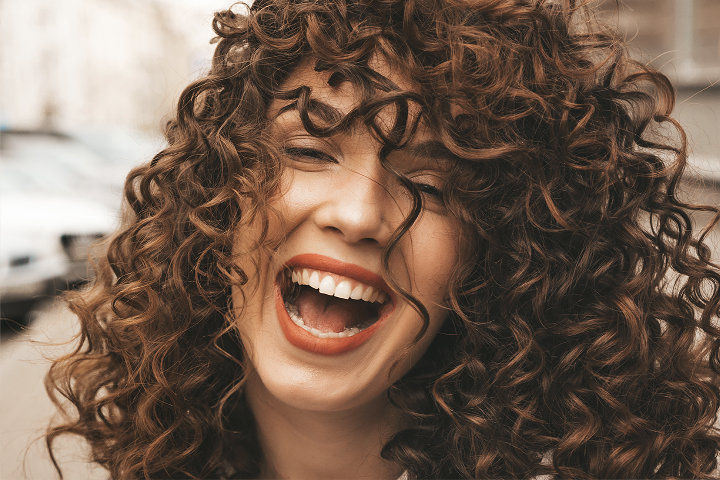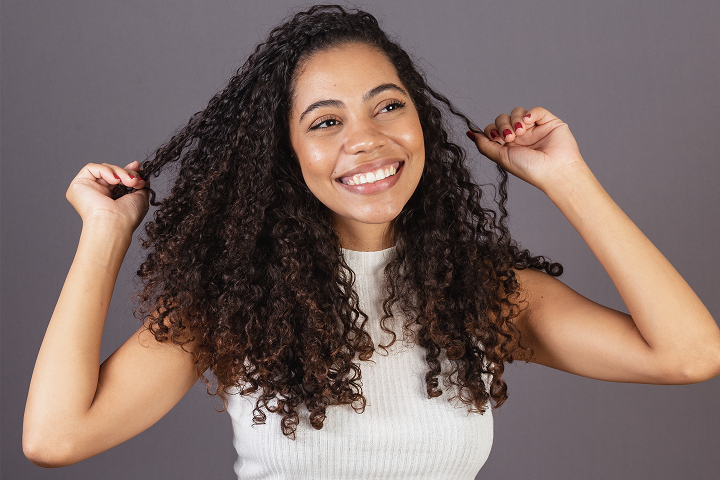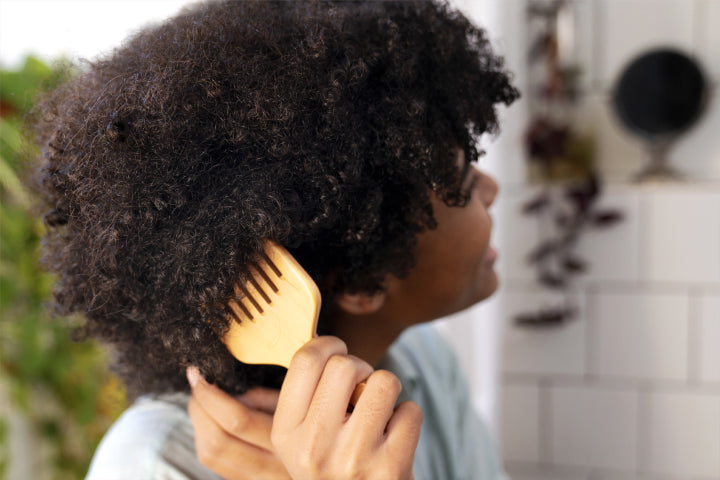Moisture and protein are essential for maintaining healthy curly hair. While it is common for people with curly hair to prioritize moisture, achieving the right balance of both is crucial for enhancing hair elasticity, preventing split ends and reducing dryness.
If your curls look flat or your hair feels dry and brittle, it could mean you are out of balance. But do not worry! We are here to help you understand if your curls need more moisture or protein. In addition to this, we will also share some valuable tips to help you get healthy, bouncy and beautiful curls. So, let us dive right in!
How do moisture and protein differ in hair care?
Before you start caring for your hair, it is important to understand the difference between moisture and protein. Moisture and protein serve different purposes for your hair. The difference starts at the smallest level.
Each hair strand is held together by bonds called disulfide bonds. Protein in hair products helps strengthen these bonds to make your hair stronger and less likely to break. Moisture, on the other hand, affects how your hair looks and feels. While protein keeps the hair shaft strong, moisture helps keep your hair smooth and hydrated.
When hair lacks protein, it loses its elasticity. This makes it more prone to breakage and less able to hold moisture. Although in most cases, damaged hair needs protein treatments, some damage might need moisture instead. Moisturizing treatments generally contain ingredients such as oils and fatty acids, which help hydrate and restore dry hair by penetrating the scalp.
Protein treatments for natural hair, in contrast, are often made from plant sources like rice, wheat, soy or silk. These hair treatment with protein fill in damaged areas of the hair and make it stronger and healthier.
Signs your hair needs moisture
When your hair lacks moisture, it can feel rough, look dull and become frizzy. The cuticles on the hair shaft raise, which causes dryness and weak curls. Here are some signs of moisture deficiency:
- Split ends: Hair splits easily and travels up the shaft.
- Frizz: Hair becomes frizzy, and curls lose definition.
- Flaky scalp: A dry scalp or dandruff can signal moisture loss.
- Dull hair: Lacks shine and appears brittle.
- Hard to detangle: Hair gets tangled easily.
To hydrate dry hair, use moisturizing shampoos, conditioners and deep treatments like hair masks or oils. Look for products with aloe vera, hyaluronic acid or glycerin to lock in moisture. Avoid sulphates, heat styling and hot water. Air-dry your hair when possible to keep it hydrated.
Signs your hair needs protein
Several factors, like coloring or chemical treatments, can lead to protein loss in hair. Here are signs your hair might need protein:
- Porous hair: Hair absorbs and loses moisture too quickly, which causes frizz and tangling.
- Low elasticity: Hair does not bounce after stretching.
- Increased shedding: Losing more than 100 strands a day.
- Flat and stringy hair: Hair looks dull and lifeless.
- Recent coloring: Chemicals weaken protein bonds in the hair.
- Gummy hair: Hair feels sticky or mushy.
To fix protein deficiency in your hair, start by adding more protein-rich foods like lean meats, nuts and eggs to your diet. Use hair products with protein like keratin or collagen to strengthen your hair. Be careful not to overdo it because too much protein can make hair stiff and break easily.
How to tell if your hair needs more moisture or protein?
Feeling confused by all the hair care products out there? You are not alone! With so many products promising to give your hair either protein or moisture, it can be hard to figure out what your hair really needs. Some products focus on adding protein, while others are all about moisture. Knowing which is best for your hair could be the key to healthier and more vibrant hair.
The fact is that healthy hair needs both moisture and protein. Protein in hair products strengthens hair and reduces the chance of damage, while moisture hydrates the hair and improves its appearance. To figure out whether your hair needs moisture or protein, start by considering your hair type.
Fine hair typically needs more protein to prevent breakage and add structure, while coarse hair with low porosity needs less protein. If your hair is porous or you have recently colored or chemically treated it, you will need more protein to repair and strengthen it. Moisture helps keep hair soft, strong and smooth.
By paying attention to your hair’s needs and adjusting your routine, you can find the right balance of protein and moisture for healthy and happy hair. You can also take a simple test to know if your hair needs more protein or moisture.
Take a strand of hair from your brush (no need to pull one from your scalp) and gently stretch it. If it snaps or feels very dry, your hair needs more moisture. If your hair feels stretchy or you are losing more strands than usual, your hair likely needs more protein.
Also Read: Nurture Your Curls: Natural Hair Care Tips for Healthier and Bouncier Hair
Conclusion
Incorporating products like Best Life’s Curl Nourish Hair (Moroccan Argan Oil) Shampoo and Conditioner and the Deep Conditioning Strength & Repair Hair Mask can provide essential moisture and nourishment to curly hair.
Our products help restore balance by moisturizing and strengthening your curls. So, if you are ready for healthier and bouncier hair, try our curly hair products today and give your curls the care they deserve!
Frequently Asked Questions (FAQs)
Q1- How to tell if your hair has too much protein?
Ans. While protein is great for your hair, too much can cause problems. Normally, you only need a protein treatment for hair 1-3 times a year, but if your hair is very porous or textured, you may need it more often. Signs of protein overload include dry hair, dullness, stiff hair, tangling and excessive shedding. Use the strand test to determine what your hair needs.
Q2- How often should you apply a protein treatment for natural hair?
Ans. Adding protein to your curly hair routine can strengthen it and prevent breakage, but do not overdo it. Start with a weekly protein treatment for hair and see how your hair responds. Use products like shampoo or leave-in conditioners for lighter protein needs. Always follow the product’s instructions for the best results.
Q3- Can hair require both moisture and protein?
Ans. Yes! For healthy and strong hair, it needs both protein and moisture. The best hair is balanced with both, which helps give you bouncy and shiny curls and strong strands. Without enough protein, your hair has a hard time holding onto moisture.
And without enough moisture, even healthy hair can look dry and dull. It means both are important for keeping your hair strong and shiny.





